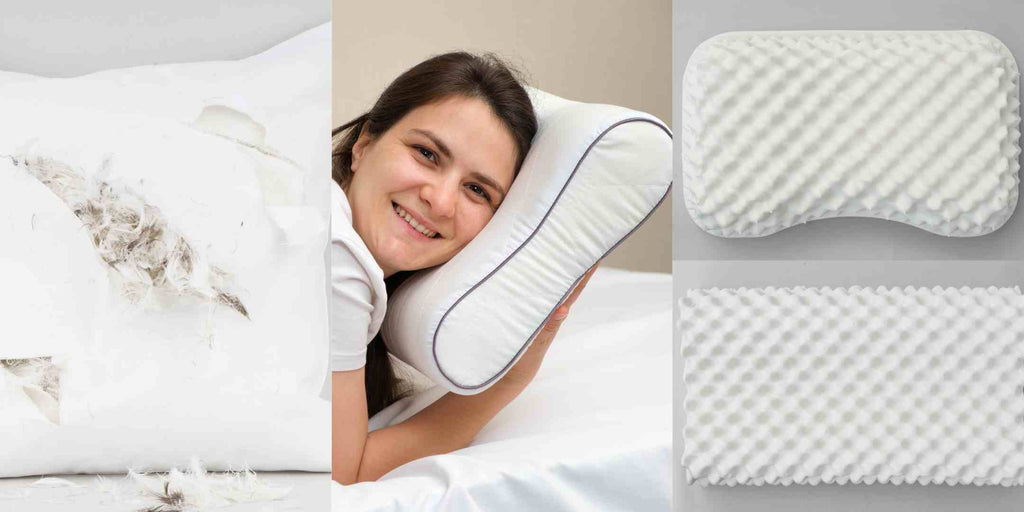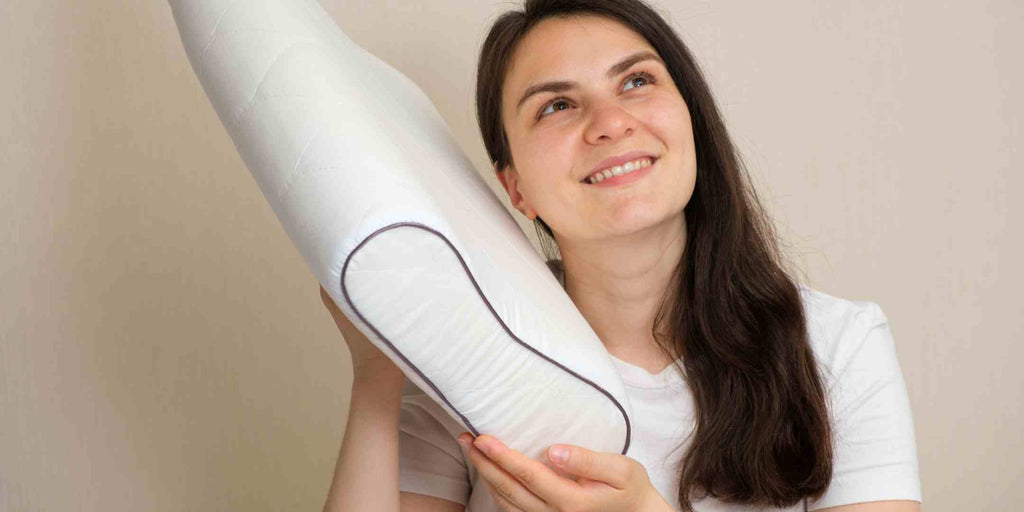Do you wake up every morning with a stiff and painful neck? If so, you're not alone. Neck pain can be a real bother, making it hard to enjoy your day and get a good night's sleep. It can also affect posture, stress, or even an uncomfortable pillow. The good news is that you don't have to resign yourself to restless nights and painful mornings because in this article, we will discuss choosing the right pillow for effective neck pain management.
Common Causes of Neck Pain

Muscle Strain
This is one of the most frequent causes of neck pain, and it often occurs due to overuse of the neck muscles, such as holding your head in an awkward position for extended periods. Poor posture can contribute to muscle strain, especially when using electronic devices or sitting at a desk.
Arthritis
Conditions like osteoarthritis or rheumatoid arthritis can affect the neck joints, leading to pain, inflammation, and reduced mobility.
Pinched Nerves
Nerves in the neck can become pinched or compressed due to various factors, such as herniated discs, bone spurs, or muscle tightness, which compression can cause localised or radiating neck pain.
Injuries
Traumatic events like car accidents, falls, or sports injuries can lead to neck trauma. Whiplash, for example, is a common injury in car accidents that can cause severe neck pain.
Poor Ergonomics
Prolonged periods of poor posture, including forward head posture when using electronic devices or working at a computer, can strain the neck muscles and ligaments, leading to chronic neck pain.
Types of Pillows and Their Pros and Cons

Memory Foam Pillows
Memory foam pillows are made from viscoelastic foam that conforms to your head and neck shape. They are also known for providing excellent support and pressure relief due to their ability to contour your body's curves.
Pros: Memory foam pillows conform to the shape of your head and neck, providing customised support that helps to relieve pressure points and reduce neck pain.
Cons: Some memory foam pillows can retain heat, which may be uncomfortable for hot sleepers.
Latex Pillows
Latex pillows are crafted from natural or synthetic latex rubber, and they offer a resilient and supportive feel, promoting proper spinal alignment during sleep.
Pros: Latex pillows offer a firm and supportive feel, promoting proper spinal alignment during sleep. Also, natural latex pillows are hypoallergenic and resistant to dust mites and other allergens.
Cons: Latex pillows can be relatively expensive compared to other pillow types. Also, some sleepers may find latex pillows too firm.
Feather Pillows
Feather pillows can be fluffed and moulded to your preferred shape, making them somewhat customisable.
Pros: Feather pillows offer a luxurious and soft sleeping surface and are often more budget-friendly than memory foam or latex options.
Cons: Feather pillows may lack adequate support for some sleepers, potentially leading to neck pain or discomfort. Also, they can be problematic for individuals with allergies, as they can harbour dust mites and allergens.
Factors to Consider When Choosing a Pillow for Neck Pain Management

Pillow Loft or Height
The loft or height of the pillow is one of the most important factors because your pillow should maintain the natural curvature of your neck and spine while you sleep. The ideal loft depends on your sleeping position:
Back Sleepers: A medium loft pillow is typically best for maintaining neck alignment.
Side Sleepers: A higher loft pillow helps support the gap between your head and shoulder.
Stomach Sleepers: A lower loft or thin pillow is preferable to prevent excessive neck strain.
Pillow Material
The pillow's material can influence comfort, support, and allergen resistance. It's essential to consider both the material and any hypoallergenic properties when choosing a pillow, especially if you have allergies.
Pillow Firmness
Pillow firmness refers to the degree of resistance the pillow provides when you rest your head on it, and selecting the right firmness is critical because it affects how well the pillow supports your neck. A pillow that is too soft may not provide enough support, leading to poor spinal alignment and potential neck discomfort. Conversely, an overly firm pillow can create pressure points, exacerbating neck pain.
Pillow Shape
Contoured or cervical pillows are designed with a curved shape to cradle the neck and head, promoting proper alignment. These can be especially helpful for those with chronic neck pain.
Sleeping Position
Your preferred sleeping position plays a significant role in pillow selection, so it is better to choose a pillow that complements your sleeping style:
Back Sleeper: Opt for a pillow that supports the natural curve of your neck.
Side Sleepers: Look for a pillow that fills the space between the neck and shoulder.
Stomach Sleeper: Consider a thin pillow or not using one to prevent excessive neck strain.
Personal Comfort
Your comfort is the most crucial factor. What works for one person may not work for another, so pay attention to how the pillow feels and if it alleviates your neck pain.
Important Note: If your neck pain is chronic or severe, consult a healthcare professional, such as a physical therapist, chiropractor, or orthopaedic specialist. They can provide personalised recommendations based on your specific condition.
Step-by-Step Guide on How to Choose the Ideal Pillow
Determine Your Sleeping Position

The first step in choosing the right pillow is identifying your primary sleeping position. Are you a side, back, or stomach sleeper, or do you change positions throughout the night? Your sleeping position significantly influences the type of pillow you need for proper support and comfort.
Consider Your Neck Pain and Health Needs

If you have neck pain or specific health concerns, consider them. Discuss any chronic conditions or pain with a healthcare professional, as they can offer recommendations tailored to your needs.
Understand Pillow Firmness

Learn about pillow firmness levels. Generally, medium-firm pillows are suitable for most people as they offer a balance of support and comfort. However, your preference and sleeping position may dictate a softer or firmer choice.
Consider Pillow Material

Different pillow materials offer various benefits:
Memory Foam: Provides excellent support and conforms to your shape. Also, it is suitable for pressure relief.
Latex: Offers firm support, durability, and natural hypoallergenic properties.
Feather/Down: Soft and moldable but may lack firm support.
Synthetic Fill: Offers various firmness options and can be hypoallergenic.
Hypoallergenic Properties

If you have allergies or asthma, consider hypoallergenic pillows designed to resist allergens like dust mites and pet dander.
Read Reviews and Seek Recommendations

Look for online reviews and seek recommendations from friends, family, or healthcare professionals who have experience with neck pain or similar conditions. Personal experiences and insights can be valuable.
Try Before You Buy (If Possible)

If you can, test the pillow in-store to assess its comfort and support. Lie down in your preferred sleeping position and ensure it feels right.
Evaluate Long-Term Comfort

Pay attention to your long-term comfort. Over time, your pillow should continue to provide adequate support and help manage any neck pain issues.
Final Thought
When it comes to ideal pillows, remember that achieving restful and pain-free sleep is a journey uniquely tailored to your individual preferences and health needs. Also, the right pillow can significantly impact your overall well-being, especially when managing neck pain, as it provides the support and comfort necessary for a refreshing night's sleep. So, prioritise your neck health, be patient in your search, and, when you find that perfect pillow, embrace the transformation it can bring to your quality of life and sleep.
Disclaimer: All the information, including the texts, images, and other materials on this website, are for educational purposes only. While we aim to provide accurate information, nothing on the Megafurniture website should be considered a replacement for medical advice, diagnosis, or treatment. Always consult a qualified medical professional before making any decisions regarding your health.








